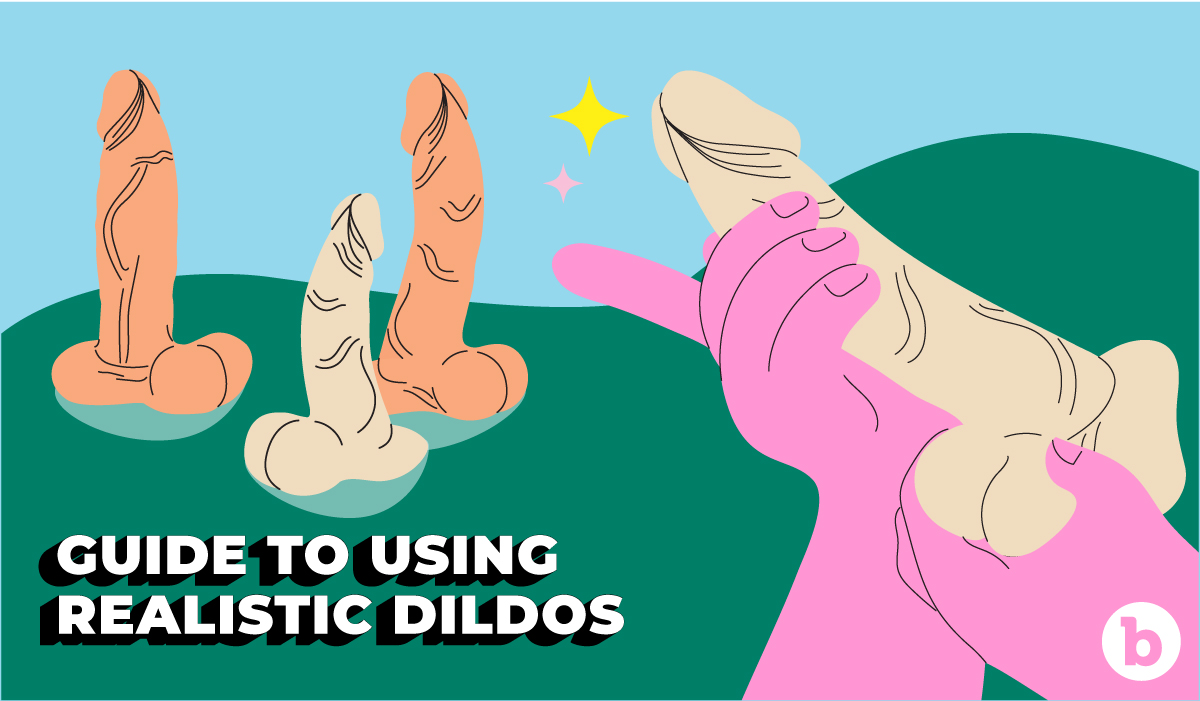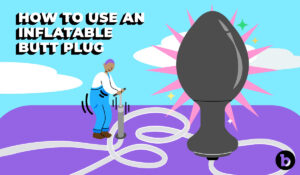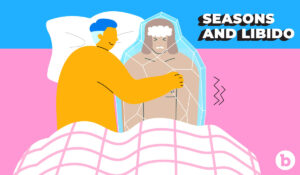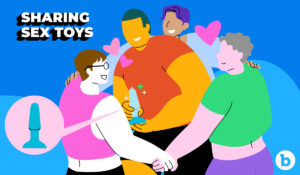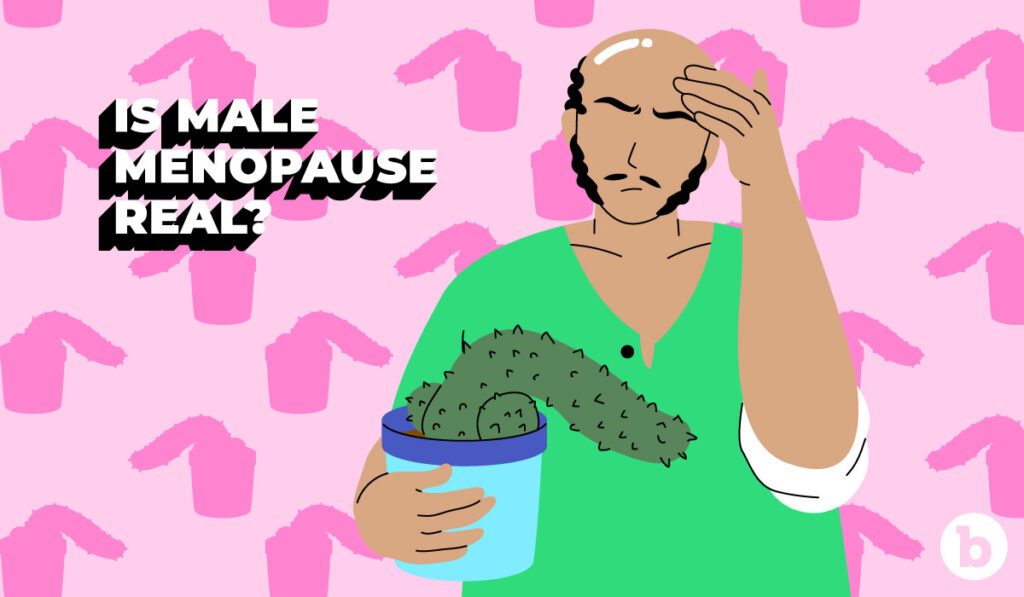
What is Andropause? The Symptoms, Causes, and Treatments of ‘Male Menopause’
The term ‘male menopause’ was first coined in the 1940s in a medical study that linked reduced sex drive and vigor in aging males to falling testosterone levels.
The term has seen increased usage in the media alongside ‘andropause’ (from the ancient Greek ‘Andros’, which means ‘male’). Medical definitions include late-onset hypogonadism and Androgen Deficiency in the Aged Male (ADAM).
Typically, andropause / male menopause refers to males in their 40s and 50s.
(Note: In this article, we refer to people who are male assigned at birth (MAAB) as ‘male’ and female assigned at birth (FAAB) as female, but we recognize that a significant number of people have a difference of sexual development (DSD) that mean they may not easily fit the binary terms of ‘male’ and ‘female’.)
Why is testosterone important for males?
Testosterone is the key ‘ingredient’ that helps males maintain their sexual ‘function’, sexual desire, fertility, and ability to perform sexually.
There is an increasing recognition that testosterone also plays a significant role in wider physical and mental well-being.
Is the andropause the male equivalent of the menopause?
In a word, no.
Menopause is defined by a relatively fast and significant reduction of the estrogen hormone in females, usually in their 40s and 50s, although it can occur earlier.
Falling testosterone levels are a natural part of aging for males. They typically see a 1% reduction in testosterone levels from their 40s onwards, although the decrease can begin in their 30s. So, unlike females, the fall is gradual rather than swift.
What are the symptoms of andropause / male menopause?
As mentioned, the key symptom of andropause is a considerably reduced sex drive. Alongside this, there may be a reduction in the number of ‘spontaneous’ erections (e.g. ‘morning wood’) and erectile dysfunction.
Other symptoms can include:
* Low energy levels and inability to tackle physical tasks
* Weight gain, specifically around the belly and breasts
* Depression and anxiety
* Insomnia
* Sharp mood swings and easily becoming irritable
* Hot flushes and sweating
* Brittleness of bones
While many of the symptoms above can also be present in menopausal women, many medical experts suggest they manifest due to other factors, most significantly lifestyle.
Excessive alcohol intake, smoking, and drug usage are all lifestyle habits that can impact the male sex drive, especially when coupled with a lack of exercise and a poor diet, and may lead to depression as well as other mental and physical health conditions.
These lifestyle factors may be further compounded by the stresses and strains of everyday life.
Males in their 40s and 50s may find themselves with growing children on one side of the family and aging parents on the other, both of which are naturally a cause of worry and concern. Female partners of a similar age may be undergoing menopause, leading to household tension.
Is the male menopause a myth?
The balance of opinion suggests that it’s largely the above factors that result in menopausal symptoms for males in their 40s and 50s rather than a sharp decline in testosterone levels.
However, there is a rare condition called hypogonadism, where the testes fail to produce a normal amount of hormones (including testosterone) and which can manifest itself from birth or middle to old age, when it’s known as late-onset hypogonadism.
Again, symptoms of late-onset hypogonadism are consistent with those highlighted for male menopause.
If you are experiencing symptoms, it’s best to seek professional medical advice. Your doctor or physician will likely ask about lifestyle and personal circumstances first and then proceed with tests to determine hormone levels.
If testosterone levels are found to be unnaturally low - referred to as Testosterone Deficiency (TD) - then you may be advised to undertake Hormone Replacement Therapy (HRT) or Testosterone Replacement Therapy (TRT).
There are risks associated with these treatments, however, which will need to be understood and balanced against the positives before undertaking them.
In the United States, there are now plenty of clinics offering HRT and TRT for ‘male menopause’.
How can I regain my sex drive?
The first step in addressing the symptoms of male menopause - especially those relating to sex drive - is of course to adjust your lifestyle where needed.
Reduce alcohol consumption, stop smoking or drug use, and eat more healthily with a balanced diet that includes plenty of fruit and vegetables and less red meat.
Walk instead of using the car for short journeys, take up an activity such as swimming or cycling or going to the gym, or find a new sport geared towards your age group. Seek support and advice if you need it, whether professional or from friends and family.
And of course, sex itself is widely acknowledged to lessen stress, and that includes self-pleasure as well as sex with a partner. If you’ve been stuck in a rut with masturbation and sex, try introducing new things to your routine.
Using prostate massagers, cock rings, or other sex toys can offer all kinds of new ways to stimulate yourself, your partner, or both of you.
Final takeaway on male menopause
In purely medical terms, there’s very little evidence that male menopause is a widespread condition, and it’s certainly not the equivalent of female menopause.
However, there’s no denying that modern life can take its toll on middle-aged males and negatively impact their sex drive. Looking at ourselves and our lifestyle choices is the first step in addressing issues around our sexual desire and performance. In addition to this, you may wish to seek professional help to further understand and treat the symptoms that fall under the umbrella term of andropause.
